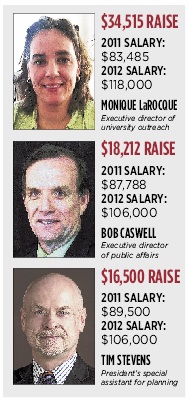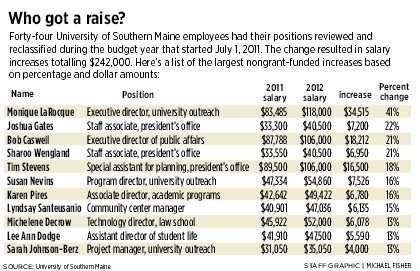Forty-four University of Southern Maine employees got salary increases of 3 percent to 41 percent this budget year under a little-known, systemwide position-review program started in 2005 to ensure fair and competitive pay.
The program’s $242,000 impact this year at USM comes to light as the university faces $5.1 million in projected budget cuts in the coming year at its campuses in Portland, Gorham and Lewiston. USM has spent nearly $1 million on raises based on position reviews over the past four years, according to university records.
USM has continued to offer such “salary adjustments” to certain employees — through the annual Salaried Employees Compensation and Classification Program — despite staffing cuts and enrollment declines. Meanwhile, most university employees went without raises for the past three years.
News of the position-review program and the resulting raises surprised and angered Ed Collom, a sociology professor and president of the USM faculty union.
Faculty and other employees across the University of Maine System haven’t had cost-of-living raises since 2009, and system administrators recently offered the faculty union a 0.5 percent increase after faculty members worked a year without a contract, Collom said.
“We’ve been told there’s no money,” Collom said. “This really raises the question: How legitimate are their claims when they can find a quarter of a million dollars to give raises to certain people? I find it appalling that some faculty members are going to lose their jobs in the coming year and yet the administration found money to give these raises. At a time of such fiscal uncertainty, these salary adjustments should be frozen.”
Four employees who work directly for USM President Selma Botman received salary increases of 18 percent to 22 percent in the fiscal year that started July 1, based on salary surveys of similar university positions nationwide.
“This is what institutions do to make sure they pay salaries that are competitive and fair,” Botman said. “This wasn’t a question of giving anyone a 20 percent raise. This is about equity. It’s not fair to pay them 20 percent less than people in similar positions at other universities.”
Botman sought pay adjustments for Tim Stevens, her chief of staff, whose salary increased $16,500 (18 percent), from $89,500 to $106,000; and Bob Caswell, the university’s public affairs director, whose salary increased $18,212 (22 percent), from $87,788 to $106,000. Two staff associates in her office received similar percentage increases when their jobs were reclassified from hourly to salaried positions, resulting in salaries of $40,500 each.
Of the 44 raises granted in fiscal 2012, 10 were grant-funded positions that require no university funding. Raises ranged from $1,400 for wrestling coach Joseph Pistone to $34,514 for executive director of university outreach Monique LaRocque.
USM gave 46 position-review-related raises in fiscal 2011 totaling $316,760; 30 raises in fiscal 2010 totaling $211,483; and 46 raises in fiscal 2009 totaling $202,265. Including the current fiscal year, the university gave 166 individual raises worth $972,585 over the past four years.
During the same period, Botman has neither asked for nor received a salary increase beyond the $203,000 she’s been paid since she started in 2008, Caswell said.
GOAL IS WELL-QUALIFIED EMPLOYEES
The Salaried Employees Compensation and Classification Program is followed at the seven universities in the system. Each university reports position reclassifications and resulting salary increases as part of regular payroll data, but the system doesn’t formally track the program’s totals year to year, said Tracey Bigney, the system’s chief human resources officer.
The program was developed by the University of Maine System administration to support the board of trustees’ compensation philosophy, according to system documents. The goal is “to attract and retain well qualified, productive employees” with compensation that is “within fiscal resources and in compliance with all applicable rules and laws” and is “competitive with similar positions in relevant labor markets and is internally equitable.”
Department heads must fund resulting salary increases from existing budgets and they are awarded administratively throughout the course of the year, university officials said. There is no requirement that the salary increases be requested during the public budget-development process.
“This is routine, ongoing business for each campus,” Bigney said, noting that budget constraints do sometimes come into play and an employee’s duties may be reduced if funds aren’t available for a salary increase.
The lack of a public approval process for these individual salary increases concerns state Sen. Brian Langley, R-Ellsworth, co-chairman of the Legislature’s Education Committee.
“My initial reaction is that it bears closer scrutiny, especially when (Gov. Paul LePage) is flat-funding higher education while other departments have seen cuts,” Langley said.
“The process should be transparent and made known and clearly factored into the budget,” Langley continued. “Lots of folks out here haven’t been getting raises. We’re looking at individual positions in the Department of Education.”
Still, Langley said, some job reclassifications and salary increases may be valid, especially when people have taken on additional duties because other positions have been cut.
That’s what happened this year in USM’s Division of Professional and Continuing Education. Three employees received increases of 13 percent to 41 percent, including LaRocque, outreach executive director, whose salary increased from $83,485 to $118,000.
LaRocque is a former associate dean who was promoted within the division to a position formerly held by Robert Hansen, who earned $116,845 in 2009. LaRocque’s old position was eliminated, so her new job and two other positions were reclassified to reflect the division of her former duties.
Sarah Johnson-Berz, a project manager, saw her salary increase $4,000, from $31,050 to $35,050; and Susan Nevins, a program director, saw her salary increase $7,526, from $47,334 to $54,860. Still, the division saved $36,910 by eliminating LaRocque’s old job.
INCREASED DUTIES REWARDED
Overall, the position-review program rewards significant increases in the scope and complexity of a salaried employee’s duties, said M.A. Watson, USM’s compensation and human resources manager.
The program applies to about 600 of the university’s 1,401 employees — a number that’s down 118 positions since 2007, Caswell said.
The opportunity to apply for position review is written into employee contracts and open to all salaried workers except faculty, deans, vice presidents and directors of large divisions.
Faculty are eligible for merit increases through post-tenure review.
Hourly employees have their own reclassification process, which is tied to strict union contract guidelines.
Employees must have positive performance assessments to be considered, though performance isn’t a factor in Watson’s market analysis, which largely focuses on data provided by the College and University Professional Association for Human Resources.
Watson compares positions at USM with other public and private colleges and universities nationwide that grant bachelor’s and master’s degrees, have annual budgets of $126 million to $383 million, and have enrollments of 3,403 to 9,446. USM’s fiscal 2012 budget is $147 million and its enrollment is 9,301, down from 11,382 in 2002.
In reviewing Stevens’ and Caswell’s positions, Watson found that similar jobs at similar institutions nationwide paid an average of $106,200 and $107,289, respectively, according to CUPA-HR.
When Botman requested the review, the University of Maine in Orono had similar positions paying $122,000 and $102,000, respectively.
Stevens came to USM with Botman, having worked for her in the past and taking a position she created for him.
Caswell has worked at USM for 32 years. His last salary adjustment was in 2009, when his pay increased $10,000 to $87,788, closer to Stevens’ $89,500 salary.
SEEING IT FROM BOTH SIDES
Caswell said he understands how the public may view his latest salary increase.
“I grew up in Maine and I know what it means to make what I do in Maine anytime, let alone during these times,” Caswell said. “I also know that I’m good at what I do and other people were getting paid a lot more than me. Selma initiated this. I did not request it. All that said, do I at times question the timing of this? Sure. But I understand why it was done and I appreciate it greatly.”
Laura Foye, chairwoman of USM’s Board of Visitors, defended the position-review program, echoing Botman’s view that an “equity adjustment” is different from a merit or cost-of-living raise.
As vice president of commercial lending at TD Bank, Foye said her company does similar market studies and must adjust salaries to attract and keep competent employees.
Foye said she also believes the economy is improving and many Maine companies are raising salaries.
“I agree it sounds like a lot,” Foye said, referring to the USM salary increases. “But when you have a critical position and you have an employee who’s not easy to replace, you want to make sure your compensation program is where the industry is.”
John Challenger, CEO of Challenger, Gray & Christmas, a Chicago-based job placement firm, questioned the UMaine system’s effort to link salaries to a national or market average.
Companies and institutions vary greatly in size, location, industry, workplace culture and job requirements, he said.
“I think it’s a false process because there is no regularity,” Challenger said. “Salaries are all over the map, so there’s no real center of what people should be paid.”
Staff Writer Kelley Bouchard can be contacted at 791-6328 or at:
kbouchard@pressherald.com
CORRECTION: This story was updated on Thursday, March 22 to reflect that certain University of Southern Maine employees received salary increases of 3 percent to 41 percent this budget year. Incorrect information was provided to the newspaper.
Send questions/comments to the editors.




Comments are no longer available on this story